Advertisements
Ratings
GATE ST Syllabus 2024 – GATE 2025 exam will be conduct by IIT, Roorkee on dates 1, 2 and 8, 9 February, 2025. Here we have provided latest Statistics syllabus & paper pattern for GATE 2024 aspirants.
All candidates with Statistics subject are advised to download this latest syllabus before starting their GATE 2024 exam preparation.
Contents
- GATE 2025 Highlights
- GATE Statistics Engineering Paper Pattern 2024
- GATE Statistics Engineering Syllabus 2024 PDF
- GATE Statistics Syllabus 2024
- GATE Statistics Syllabus Weightage 2024
- GATE Statistics Engineering Guidance
- GATE Statistics Syllabus & Exam Pattern FAQs
- Related Links
- GATE Total Information & Guidance
GATE 2025 Highlights
| GATE 2025 Conducting Body | IIT, Roorkee |
| GATE 2025 Exam Date | 1, 2, 8, 9 February, 2025 |
| GATE 2025 Total Subjects | 30 |
| GATE 2025 Exam Mode | ONLINE Computer Based Test (CBT) |
| GATE 2025 Exam Duration | 3 hours (180 minutes) |
| GATE 2025 Total Questions | 10 (GA) + 55 (subject)= 65 |
| GATE 2025 Total Marks | 100 |
| GATE 2025 Question Type | MCQ, MSQ, NAT |
GATE Statistics Engineering Paper Pattern 2024
| Paper Sections | Marks Distribution |
|---|---|
| Subject Questions | 85% of the total marks. |
| General Aptitude | 15% of the total marks. |
GATE Statistics Engineering Syllabus 2024 PDF
| General Aptitude Syllabus (Common to all papers) [pdf] | Download |
| GATE Syllabus for Statistics (ST) [pdf] | Download |
GATE Statistics Syllabus 2024
| Chapters | Topics |
| Calculus | Finite, countable and uncountable sets; Real number system as a complete ordered field, Archimedean property; Sequences of real numbers, convergence of sequences, bounded sequences, monotonic sequences, Cauchy criterion for convergence; Series of real numbers, convergence, tests of convergence, alternating series, absolute and conditional convergence; Power series and radius of convergence; Functions of a real variable: Limit, continuity, monotone functions, uniform continuity, differentiability, Rolle’s theorem, mean value theorems, Taylor’s theorem, L’ Hospital rules, maxima and minima, Riemann integration and its properties, improper integrals; Functions of several real variables: Limit, continuity, partial derivatives, directional derivatives, gradient, Taylor’s theorem, total derivative, maxima and minima, saddle point, method of Lagrange multipliers, double and triple integrals and their applications. |
| Matrix Theory | Subspaces of ℝ𝑛𝑛 and ℂ𝑛𝑛, span, linear independence, basis and dimension, row space and column space of a matrix, rank and nullity, row reduced echelon form, trace and determinant, inverse of a matrix, systems of linear equations; Inner products in ℝ𝑛𝑛 and ℂ𝑛𝑛, Gram-Schmidt orthonormalization; Eigenvalues and eigenvectors, characteristic polynomial, Cayley-Hamilton theorem, symmetric, skew-symmetric, Hermitian, skew-Hermitian, orthogonal, unitary matrices and their eigenvalues, change of basis matrix, equivalence and similarity, diagonalizability, positive definite and positive semi-definite matrices and their properties, quadratic forms, singular value decomposition. |
| Probability | Axiomatic definition of probability, properties of probability function, conditional probability, Bayes’ theorem, independence of events; Random variables and their distributions, distribution function, probability mass function, probability density function and their properties, expectation, moments and moment generating function, quantiles, distribution of functions of a random variable, Chebyshev, Markov and Jensen inequalities. |
| Standard discrete and continuous univariate distributions | Bernoulli, binomial, geometric, negative binomial, hypergeometric, discrete uniform, Poisson, continuous uniform, exponential, gamma, beta, Weibull, normal. Jointly distributed random variables and their distribution functions, probability mass function, probability density function and their properties, marginal and conditional distributions, conditional expectation and moments, product moments, simple correlation coefficient, joint moment generating function, independence of random variables, functions of random vector and their distributions, distributions of order statistics, joint and marginal distributions of order statistics; multinomial distribution, bivariate normal distribution, sampling distributions: central, chi-square, central t, and central F distributions. Convergence in distribution, convergence in probability, convergence almost surely, convergence in r-th mean and their inter-relations, Slutsky’s lemma, Borel-Cantelli lemma; weak and strong laws of large numbers; central limit theorem for i.i.d. random variables, delta method. |
| Stochastic Processes | Markov chains with finite and countable state space, classification of states, limiting behaviour of n-step transition probabilities, stationary distribution, Poisson process, birthand- death process, pure-birth process, pure-death process, Brownian motion and its basic properties. |
| Estimation | Sufficiency, minimal sufficiency, factorization theorem, completeness, completeness of exponential families, ancillary statistic, Basu’s theorem and its applications, unbiased estimation, uniformly minimum variance unbiased estimation, Rao-Blackwell theorem, Lehmann-Scheffe theorem, Cramer-Rao inequality, consistent estimators, method of moments estimators, method of maximum likelihood estimators and their properties; Interval estimation: pivotal quantities and confidence intervals based on them, coverage probability. |
| Testing of Hypothesis | Neyman-Pearson lemma, most powerful tests, monotone likelihood ratio (MLR) property, uniformly most powerful tests, uniformly most powerful tests for families having MLR property, uniformly most powerful unbiased tests, uniformly most powerful unbiased tests for exponential families, likelihood ratio tests, large sample tests. |
| Non-parametric Statistics | Empirical distribution function and its properties, goodness of fit tests, chi-square test, Kolmogorov-Smirnov test, sign test, Wilcoxon signed rank test, Mann-Whitney U-test, rank correlation coefficients of Spearman and Kendall. |
| Multivariate Analysis | Multivariate normal distribution: properties, conditional and marginal distributions, maximum likelihood estimation of mean vector and dispersion matrix, Hotelling’s T2 test, Wishart distribution and its basic properties, multiple and partial correlation coefficients and their basic properties. |
| Regression Analysis | Simple and multiple linear regression, R2 and adjusted R2 and their applications, distributions of quadratic forms of random vectors: Fisher-Cochran theorem, Gauss-Markov theorem, tests for regression coefficients, confidence intervals. |
GATE Statistics Syllabus Weightage 2024
| Topics | Weightage |
| Probability | 20% |
| Calculus | 15% |
| Multivariate Analysis | 10% |
| Matrix Theory | 8% |
| Stochastic Processes | 8% |
| Estimation | 8% |
| Testing of Hypotheses | 8% |
| Regression Analysis | 8% |
GATE Statistics Engineering Guidance
- How to Prepare for GATE Statistics: A Comprehensive Guide
- GATE ST Previous Year Solved Papers – (2023-2019)
- GATE ST Syllabus 2025: Statistics
GATE Statistics Syllabus & Exam Pattern FAQs
What is the syllabus for the GATE Statistics (ST) exam?
The GATE Statistics syllabus covers a wide range of topics in statistics. It includes subjects such as Probability, Random Variables, Probability Distributions, Estimation, Testing of Hypotheses, Regression Analysis, Design of Experiments, Sampling Theory, Multivariate Analysis, Stochastic Processes, and more. The detailed syllabus can be found on the official GATE website or on GATE2016.info.
Are there any specific books recommended for GATE Statistics preparation?
While there are no specific books recommended by GATE2016.info, there are several books available in the market that cover the topics mentioned in the syllabus. Some popular reference books for Statistics include 'Mathematical Statistics' by John E. Freund, 'Probability and Statistics' by Morris H. DeGroot and Mark J. Schervish, and 'Introduction to the Theory of Statistics' by Alexander McFarlane Mood et al.
How many questions are asked in the GATE Statistics exam?
The GATE Statistics exam consists of a total of 65 questions. These questions are a mix of multiple-choice questions (MCQs) and numerical answer type (NAT) questions. The exam is conducted for a total of 100 marks.
What is the exam pattern for the GATE Statistics paper?
The GATE Statistics paper follows the same exam pattern as other GATE papers. The exam duration is 3 hours, and it consists of two types of questions: Multiple Choice Questions (MCQs) and Numerical Answer Type (NAT) questions.
MCQs have four choices, out of which only one is correct, while NAT questions require candidates to enter a numerical value as the answer using a virtual keyboard.
Are there any negative marks for wrong answers in the GATE Statistics exam?
Yes, negative marking is applicable for MCQs in the GATE Statistics exam. For each incorrect answer in MCQs, 1/3rd of the marks allotted to the question will be deducted as a penalty. However, there is no negative marking for incorrect answers in NAT questions.
Can I use a calculator during the GATE Statistics exam?
Yes, candidates are allowed to carry a non-programmable scientific calculator to the GATE Statistics exam. However, the use of a virtual calculator provided on the computer screen during the exam is also permitted.
Are there any specific tips for effective preparation for the GATE Statistics exam?
Effective preparation for the GATE Statistics exam requires a thorough understanding of the syllabus, regular practice with previous years' question papers, and the use of standard reference books.
Creating a study schedule, taking mock tests, and solving sample papers can help in assessing one's preparation level. Additionally, understanding the concepts and practicing numerical problems is crucial for success in the exam.
Are there any specific GATE coaching institutes or online platforms recommended for Statistics preparation?
While GATE2016.info does not endorse any specific coaching institutes or online platforms, there are several coaching institutes and online platforms that offer GATE preparation courses for Statistics.
It is advisable to research and choose a reputable coaching institute or online platform based on reviews, recommendations, and their track record.
Is it necessary to solve previous years' question papers for the GATE Statistics exam?
Solving previous years' question papers is highly recommended for the GATE Statistics exam.
It helps candidates familiarize themselves with the exam pattern, understand the types of questions asked, and identify important topics. It also aids in time management and improves problem-solving skills.
Can GATE Statistics be a suitable choice for higher studies or career opportunities?
Yes, qualifying in the GATE Statistics exam opens up various opportunities for higher studies and career advancements.
It can lead to admissions in prestigious postgraduate programs in Statistics, as well as opportunities in research organizations, data analytics companies, government agencies, academic institutions, and more.
Statistics plays a crucial role in various industries, and a GATE qualification can enhance career prospects in the field of Statistics.
Recent Posts
- AAI Through GATE 2024 – JE (Junior Executive)
- M Tech and MS Programs Through GATE and GRE: Navigating Postgraduate Options
- Job Opportunities After GATE 2024 in India: What You Didn’t Know!
- BSPHCL Through GATE 2024 – 40 AEE
Related Tags
Gate statistics syllabus & exam pattern pdf download 2025, Gate statistics syllabus & exam pattern pdf 2025, Gate statistics syllabus & exam pattern 2025, gate statistics syllabus pdf 2025, gate statistics question paper 2025, gate statistics scope 2025, gate statistics syllabus 2025, gate statistics syllabus 2025
Related Links
| GATE (Reasoning & Aptitude & Maths) Books |
| GATE Guide Books |
GATE Total Information & Guidance
Click below given links to get further information.




